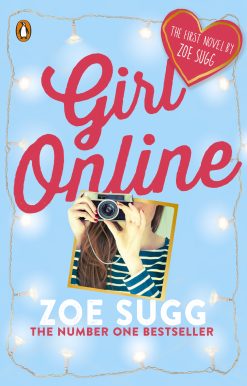No gift registry found click here to create new registry
Cart contain Gift Registry Items cannot add products
Everything Else in the Universe
7.00 JOD
Please allow 2 – 5 weeks for delivery of this item
Add to Gift RegistryDescription
In the midst of the Vietnam War, a young girl struggles to embrace change in this tender family story for fans of Cynthia Lord and Wendy MaasLucy is a practical, orderly person–just like her dad. He taught her to appreciate reason and good sense, instilling in her the same values he learned at medical school. But when he’s sent to Vietnam to serve as an Army doctor, Lucy and her mother are forced to move to San Jose, California, to be near their relatives–the Rossis–people known for their superstitions and all around quirky ways. Lucy can’t wait for life to go back to normal, so she’s over the moon when she learns her father is coming home early. It doesn’t even matter that he’s coming back “different.” That she can’t ask too many questions or use the word “amputation.” It just matters that he’ll be home. But Lucy quickly realizes there’s something very wrong when her mother sends her to spend the summer with the Rossis to give her father some space. Lucy’s beside herself, but what’s a twelve-year-old to do? It’s a curious boy named Milo, a mysterious packet of photographs and an eye-opening mission that makes Lucy see there’s more to life than schedules and plans, and helps to heal her broken family. The latest from critically-acclaimed author Tracy Holczer is a pitch-perfect middle grade tale of family and friendship that’s sure to delight fans of One for the Murphys and Rules.
Additional information
| Weight | 0.21 kg |
|---|---|
| Dimensions | 1.99 × 12.86 × 19.69 cm |
| Format | |
| Language | |
| Pages | 288 |
| Publisher | |
| Year Published | 2019-6-11 |
| Imprint | |
| For Ages | 5 |
| Publication City/Country | USA |
| ISBN 10 | 0147508479 |
| About The Author | Tracy Holczer is the author of the critically acclaimed novel The Secret Hum of a Daisy. She lives in Southern California with her husband, three daughters, and two rather fluffy dogs named Buster and Molly. She has a deep love for the mountains where she grew up, the lakes and rivers that crisscrossed her childhood, so she writes them into her stories. |
Praise for Everything Else in the Universe:A South Carolina Junior Book Award Nominee – 2020-2021An ILA Teachers’ Choices Reading List – 2019A Charlotte Huck Honoree – 2019★“Affectingly tracing Lucy’s struggles with her altered family, Holczer also credibly portrays the conflicting views on the war, from protestors to former vets. Well-grounded in its era and peopled by fully realized characters, the book is a resonant historical novel and a thoughtful exploration of how war and injury affect family, friendships, and individual growth.” —Publishers Weekly, starred review“Lucy’s adjustments are thoughtfully examined, and her evolving efforts to stabilize her family in general, and her father in particular, are well crafted…Holczer does a fine job of piercing the weight with bits of family levity, and with the ethereal beauty of the dragonflies—Milo’s obsession—that flit in and out of the story.” —Booklist“Lyrically written, the novel portrays the war's corrosive, divisive impacts with compassion…A touching, memorable read that explores the costs, large and small, of an unpopular war.” —Kirkus “The novel introduces a nuanced view of the Vietnam War to readers…This is a quiet, tender work of historical fiction about grief, love, and learning to let go…A worthy addition to any middle grade collection.” —School Library Journal“Heartbreakingly poignant…the portrait of two children maturing with grace and tolerance is triumphant.” —Horn Book Magazine |
|
| Excerpt From Book | Chapter One Stuck Like a Fish A pale green balloon shaped like a fish was trapped in the branches of the willow tree down by the creek. A trout, maybe. From her bedroom window, Lucy watched it flutter there, caught by its string, wondering if it might break free and go for a swim. She took an inventory of her garden around the tree, California fuchsia and morning glory, plants she’d carefully chosen over the course of the year for their hardiness and survival skills, a practical reminder that she would survive, too. If she were a superstitious person, like the rest of her irrational family, maybe she would have seen that fish as a sign of good luck, or a gift from the heavens meant to bring her hope. It was a fish, after all, and her family was especially irrational about fish stories, the way most people were irrational about four-leaf clovers or wishing on dandelion fluff. But Lucia Mercedes Evangeline Rossi was, most definitely, not a superstitious person. She never threw salt over her shoulder, like Great-Aunt Lilliana, causing a slip hazard, nor did she believe that bird feathers in the house brought the evil eye. She didn’t believe it was good luck to hear a cat sneeze, nor bad luck to trim her toenails on a Thursday. Lucy had recently had the misfortune of watching the aunts chant over the youngest of her three cousins, all named Joe, who had the flu. They lit candles and put a tomato on his belly button. A to-ma-to on his bel-ly but-ton. And then he threw up all over them anyway. It was proof that Reason should govern all things. Just like Dad always said. Maybe if Lucy had grown up in San Jose with the rest of the Rossis, she’d happily wear amulets made of rue to protect her from falling pianos or unlucky eyebrows and she’d believe things “deep down in her Rossi bones.” But she and Mom had been saved from all that, having only moved to San Jose when Dad was sent to Vietnam. Living first in Boston, then Chicago while Dad went to medical school and finished his residencies made them “resilient, well-rounded women” who were “not given to hysterics.” Although Lucy was a practical person, an orderly person, a thinker of thoughts just like her father, she had done three things repeatedly while Dad was in Vietnam. She did not see this as a ritual or superstition as much as she believed it to be a recipe of sorts, meant to make her feel better. Like Papo Angelo’s square noodle soup. Lucy had written it all down in an essay for Mrs. Peacock in sixth grade last year, arguing the importance of what she called her behavioral comfort routine—perfect for anyone who might be in need of a plan—which Lucy valued just as much as her poster of Mohs’ Mineral Table of Hardness for her rock collection, or her entire set of gold-embossed Encyclopaedia Britannica, a gift from her father on her sixth birthday. When Linda McCollam—with her flaming mustard argyle socks and plaid miniskirt—read Lucy’s essay on the Open House board and asked, “Why can’t you just be normal?” Lucy stared at her, dumbfounded by both the question and how anyone with flaming mustard argyle socks and a plaid miniskirt might be the one to ask it. In trying to understand why self-important Linda McCollam, who was the actual granddaughter of Millard McCollam of Millard McCollam Elementary fame, would say such a thing, Lucy turned to her essay on the board and tried to see it from a different perspective. It simply detailed how: 1) Each morning, Lucy put a dab of Aqua Velva on her wrist to keep her nasal passages from forgetting the smell of her father. 2) Each afternoon, Lucy went to her windowsill and counted the small stones Dad had sent in each of his letters. He’d asked her to look up what sorts of rocks he was finding on the other side of the world, categorize them against Mohs’ Mineral Table of Hardness and report her findings. Discovery: both sides of the world had the same rocks. And finally: 3) Each evening, right before bed, Lucy stared at her favorite picture, the one of her sitting on Dad’s lap, five years old with a rather serious expression, pressing a stethoscope to his chest while looking up into his face. She stared intently at this picture so she would remember Dad’s clean-shaven face, the loud-slow thump of his heart. After Linda McCollam had flounced away, Mrs. Peacock had come up behind Lucy and reminded her of the unit they’d studied on homeostasis in biology a few months before. Homeostasis was from the Greek word for “same” or “steady.” It was the process by which living things maintained a stable condition necessary for survival. Lucy understood the process to mean physical survival, like the body constantly working to remain steady at 98.6 degrees, no matter the weather or hotheaded encounters with Linda McCollam, and so she hadn’t thought of it any other way. Until then. “Homeostasis isn’t just about your physical condition, but your feeling, and thinking as well. Sometimes we need to do things that make us feel better, even if they don’t make sense to anyone else.” Lucy was comforted by this and so began referring to her behavioral comfort routine as her Homeostasis Extravaganza. All perfectly normal. Even Mrs. Peacocksaid so. Lucy watched the creek bubble silently, the balloon still stuck, and turned on the small stereo next to the window, where she pushed a Beethoven eight-track into its slot. The Piano Sonata No. 14 in C minor was especially relaxing as she counted her windowsill stones for the last time, placing them one by one into the empty cigar box she’d snatched from Papo’s house. She then placed the bottle of Aqua Velva beside the stones, along with her essay and stethoscope picture, and closed the sweet-smelling lid, she hoped, forever. She wouldn’t have to partake in her Extravaganza anymore because the waiting was over. Even though Dad was coming home changed, in exactly two hours and seven minutes, he was finally coming home, and everything would go back to normal. But as soon as she slid the box under her bed, she went all jangly on the inside, as though her bones had come loose from their tethers. Even though there was absolutely, positively no reason for it, she couldn’t talk herself out of the jangles until she’d taken every single stone out of the box and put them back on the windowsill, in order of hardness, sprayed Aqua Velva on her wrist, and set the stethoscope picture back on her nightstand table. All where they belonged. For the first time, she wondered if there was such a thing as too much homeostasis, and if perhaps Linda McCollam had been right after all. |
Only logged in customers who have purchased this product may leave a review.
Related products
-
On backorder 2-5 Weeks to Arrive
Add to Gift RegistryGirl Online
Paperback
7.99 JOD -
On backorder 2-5 Weeks to Arrive
Add to Gift Registry -
Low stock
Add to Gift Registry -
On backorder 2-5 Weeks to Arrive
Add to Gift Registry





Reviews
There are no reviews yet.